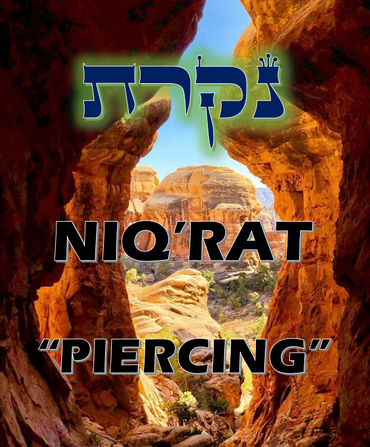MY GOODNESS
by Jeremy Chance Springfield
6/9/18
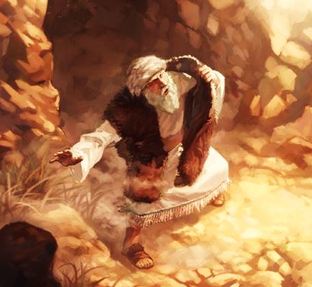
The desire of the believer is naturally towards things spiritual. A renewed heart will ultimately turn towards heavenly matters. It is impossible for a citizen of the Kingdom to truly want the fleeting aspects of this world. While the tendency to sin is an unavoidable factor while stuck in these bodies of flesh and blood, our innate longing as redeemed spirits will inevitably be to reach for what is righteous and true. This is what it means to be changed by the Holy One and brought into covenant by the blood of Yeshua. We seek first the Kingdom and His righteousness.
Even so, even in that turning towards truth and things eternal, we can get skewed. It is easily done, too. With minds set on eternal matters, the believer can accidentally assume we know what we spiritually need, instead of knowing whom we need, and what He wants to give us. Such skewed vision is something that happens to the best of us. Not a one of us in our walk of faith is so spiritual as to be immune to wrongly seeking what we need from Him.
Take Moses, for instance.
His relationship with the Holy One is unparalleled in all of Scripture: A fallen man chosen for the position of a steward who would receive straight from heaven the the pure Word to bring to the people of the Most High. Nobody else can put that kind of accomplishment on their résumé. He served the will of Heaven in a truly special way. Yet, again – he is a great example of wanting from the Holy One a righteous thing, but not the right thing.
If Moses can get it wrong, know well that we can, too. But it is in looking at the situation where this happened that we can see just how easily it is to become skewed in our heavenly desires, and to also see what it is that He really wants to give us.
The passage is found in Exodus 33:18. Moses has just been assured that the Holy One shall be with them as they make the journey from Mount Sinai to the land promised to Abraham and his descendants, and he then utters a single request from the Most High.
Even so, even in that turning towards truth and things eternal, we can get skewed. It is easily done, too. With minds set on eternal matters, the believer can accidentally assume we know what we spiritually need, instead of knowing whom we need, and what He wants to give us. Such skewed vision is something that happens to the best of us. Not a one of us in our walk of faith is so spiritual as to be immune to wrongly seeking what we need from Him.
Take Moses, for instance.
His relationship with the Holy One is unparalleled in all of Scripture: A fallen man chosen for the position of a steward who would receive straight from heaven the the pure Word to bring to the people of the Most High. Nobody else can put that kind of accomplishment on their résumé. He served the will of Heaven in a truly special way. Yet, again – he is a great example of wanting from the Holy One a righteous thing, but not the right thing.
If Moses can get it wrong, know well that we can, too. But it is in looking at the situation where this happened that we can see just how easily it is to become skewed in our heavenly desires, and to also see what it is that He really wants to give us.
The passage is found in Exodus 33:18. Moses has just been assured that the Holy One shall be with them as they make the journey from Mount Sinai to the land promised to Abraham and his descendants, and he then utters a single request from the Most High.

And he said, “You must let me see – please – Your glory!”

Now, this is not so much as a request as it is a demand. The Hebrew has it in the imperative state: HAR’ANI “You must let me see…” Moses is demanding to see the glory of the Most High. That is a bit odd, but perhaps he was feeling that the mercy shown to him and the people immediately prior to this signaled the best time ever to bring this up. Still, Moses demanded.
But even more, isn’t it a little odd for Moses to ask to see the glory of the Holy One? Think about it. He had been personal witness to the Presence in the burning bush at Sinai that kicked-off his entire relationship with the Most High. He had been the executor of the will of the Deity of the Hebrews before Pharaoh with all ten plagues. He had seen an entire sea split in half at the power of the One he served. He watched as fire and cloud descended from heaven onto this mountain at the foot of which he now stood, and he received from that glorious occasion divinely-inscribed Words that would lead us all as Kingdom Law.
One would think that glory was something he had already been shown.
Moses, for some reason, thought otherwise – he wanted something more intimate – and so he uttered what he thought he needed from the hand of Heaven. It wasn’t an evil request, to be sure. It wasn’t asking for a sinful, selfish thing. He had developed a unique relationship with the Holy One and wanted it to be deepened in a way he thought was the next logical step. He was blessed with a closeness to the Almighty that most believers have still never experienced, and it was because of this relationship that he wanted to see the face of the Most High, to see Him in all His glory.
So again, it wasn’t an evil request, but it also wasn’t the right request. Moses knew what he wanted from the Almighty, but Moses didn’t know really what it was that he needed from the Almighty. For all the spiritual experiences he had been blessed to be a part of, he simply missed it at this time.
And that is okay.
The Holy One did not reprimand Moses. He did not discipline His servant because he asked for something that wasn’t in his best interest. Rather, the Most High clarified what it was that Moses needed most, and what it was that Moses was about to receive from Him. Our Creator responds to the words of Moses in Exodus 33:19-23.
But even more, isn’t it a little odd for Moses to ask to see the glory of the Holy One? Think about it. He had been personal witness to the Presence in the burning bush at Sinai that kicked-off his entire relationship with the Most High. He had been the executor of the will of the Deity of the Hebrews before Pharaoh with all ten plagues. He had seen an entire sea split in half at the power of the One he served. He watched as fire and cloud descended from heaven onto this mountain at the foot of which he now stood, and he received from that glorious occasion divinely-inscribed Words that would lead us all as Kingdom Law.
One would think that glory was something he had already been shown.
Moses, for some reason, thought otherwise – he wanted something more intimate – and so he uttered what he thought he needed from the hand of Heaven. It wasn’t an evil request, to be sure. It wasn’t asking for a sinful, selfish thing. He had developed a unique relationship with the Holy One and wanted it to be deepened in a way he thought was the next logical step. He was blessed with a closeness to the Almighty that most believers have still never experienced, and it was because of this relationship that he wanted to see the face of the Most High, to see Him in all His glory.
So again, it wasn’t an evil request, but it also wasn’t the right request. Moses knew what he wanted from the Almighty, but Moses didn’t know really what it was that he needed from the Almighty. For all the spiritual experiences he had been blessed to be a part of, he simply missed it at this time.
And that is okay.
The Holy One did not reprimand Moses. He did not discipline His servant because he asked for something that wasn’t in his best interest. Rather, the Most High clarified what it was that Moses needed most, and what it was that Moses was about to receive from Him. Our Creator responds to the words of Moses in Exodus 33:19-23.
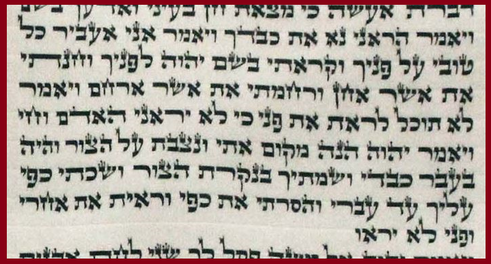
19 And He said, “I shall pass all My goodness before your face, and I shall call out with the Name YHWH before you, and I shall be merciful to whom I shall be merciful, and I shall be compassionate to whom I shall be compassionate.”
20 And He said, “You are not able to see My face, for no man shall see Me, and live.”
21 And YHWH said, “Behold! A place is with Me, and you shall stand upon the rock,
22 and it shall be in the passing of My glory, then I shall set you in the hole of the rock, and upon you shall My palm cover, until I pass by.
23 And I shall take away My palm, and you shall see My back, but My face you shall not see.”
20 And He said, “You are not able to see My face, for no man shall see Me, and live.”
21 And YHWH said, “Behold! A place is with Me, and you shall stand upon the rock,
22 and it shall be in the passing of My glory, then I shall set you in the hole of the rock, and upon you shall My palm cover, until I pass by.
23 And I shall take away My palm, and you shall see My back, but My face you shall not see.”
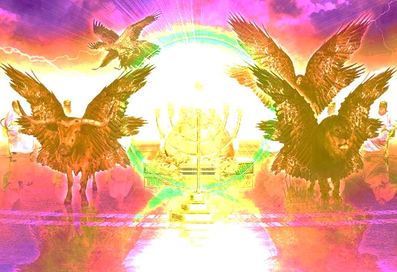
Here is the beautiful and clarifying reply to Moses! The Almighty replies in verse 20 that Moses could not see “My face” and live, which illuminates the request Moses was asking of Him: he wanted to see the true, unconcealed Presence of the One who had given man this awesome covenant. It must be remembered at this point that although the Text of Scripture tells us that Moses spoke “face to face” (see Exodus 33:11 in particular, as well as in Numbers 14:14, Deuteronomy 5:4, and Deuteronomy 34:10) with the Most High, that such an expression is an idiom referring to intimate discourse between two parties, and does not convey an actual physical event in reality where two are literally “face to face.” Rather, the reality of the revelatory event of the giving of the Torah during the mountaintop meetings is that Moses was engulfed in a dark cloud while in the Presence of the Almighty (see Exodus 20:21 and Exodus 24:15-18). When this is understood, we can appreciate better the situation and the words that are being exchanged. Moses desired to see the Creator’s glory without the protective dark cloud enshrouding Him, but the Holy One responded by promising to show Him something better: “My goodness.”
Moses did not need the glory of the Holy One. To see that would bring death – too much for any man to witness and live to tell. No, Moses needed something from the Most High that he could share with a nation who had just descended into apostasy from the One who had so recently rescued them from the future of a life of hopeless slavery. Moses and those whom he would lead needed not the glory of the Holy One, but rather, the goodness of the Holy One.
Meditate on that truth.
For each of us, this example stands, as well. We have no business seeking the glory of the One we serve. It will get us nowhere. The face of Moses shone with radiant light just from being in the cloud atop the mountain, so near the Presence of the Creator. Photons leapt unexplainably from the carbon-based flesh of a human being just from his proximity to the Most High. Simply being near to the Almighty was doing things to Moses that a man in his sin-scarred flesh is not supposed to experience. To see Him in His glory would have likely ignited the servant into a sparking flame, and then that would be it.
Again, there is nothing wrong with the desire for that astounding intimate moment we might be seeking in His Presence. Such lofty sentiment is even seen in the ultra-spiritual eroticism of the words of the Song of Songs, where we read the parallel thought to Moses’ request in 2:14 of that unmatched love song.
Moses did not need the glory of the Holy One. To see that would bring death – too much for any man to witness and live to tell. No, Moses needed something from the Most High that he could share with a nation who had just descended into apostasy from the One who had so recently rescued them from the future of a life of hopeless slavery. Moses and those whom he would lead needed not the glory of the Holy One, but rather, the goodness of the Holy One.
Meditate on that truth.
For each of us, this example stands, as well. We have no business seeking the glory of the One we serve. It will get us nowhere. The face of Moses shone with radiant light just from being in the cloud atop the mountain, so near the Presence of the Creator. Photons leapt unexplainably from the carbon-based flesh of a human being just from his proximity to the Most High. Simply being near to the Almighty was doing things to Moses that a man in his sin-scarred flesh is not supposed to experience. To see Him in His glory would have likely ignited the servant into a sparking flame, and then that would be it.
Again, there is nothing wrong with the desire for that astounding intimate moment we might be seeking in His Presence. Such lofty sentiment is even seen in the ultra-spiritual eroticism of the words of the Song of Songs, where we read the parallel thought to Moses’ request in 2:14 of that unmatched love song.

My dove! In the clefts of the rock, in the secret stairway, you must let me see your face; you must let me hear your voice, for your voice is sweet, and your face is beautiful.
There is so much that could be unpacked in this heady longing penned by the hand of Solomon, but suffice it for now that it shows us the depth of spiritual desire in a beautiful parallel to the desire of Moses in Exodus 33: it is natural to want that intimacy from the Holy One, and so the believer, like Moses, is not to be condemned in such moments where we are off in what we seek. He will correct us in His mercies. Although the desire may be understood, our mortal state requires He gives us something much more applicable to our situation.
And so it is His goodness that we desperately need.
That goodness will carry us forward.
Moses was about to lead an entire nation into the land promised them, and the goodness of the Most High would be their daily bread – not the glory that would destroy them if they were to witness it. Goodness is what is needed, not glory.
Note how the account progresses in the next chapter of Exodus. There is no chapter break in the Hebrew, so the story continues despite the English divisions inserted. In Exodus 34:5-7 we read of the event that the Most High said He would perform for Moses. After telling Moses to bring up a new pair of stone tablets to the top of Sinai, the narrative picks up again.
And so it is His goodness that we desperately need.
That goodness will carry us forward.
Moses was about to lead an entire nation into the land promised them, and the goodness of the Most High would be their daily bread – not the glory that would destroy them if they were to witness it. Goodness is what is needed, not glory.
Note how the account progresses in the next chapter of Exodus. There is no chapter break in the Hebrew, so the story continues despite the English divisions inserted. In Exodus 34:5-7 we read of the event that the Most High said He would perform for Moses. After telling Moses to bring up a new pair of stone tablets to the top of Sinai, the narrative picks up again.
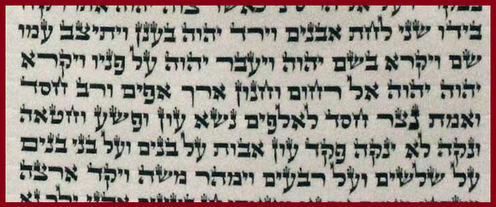
5 And YHWH descended in a cloud, and stood with him there, and called out in with the Name YHWH.
6 And YHWH passed before his face, and called out: “YHWH, YHWH, El of compassion, and merciful, long-suffering, and magnificent [in] loving-kindness and truth,
7 guarding loving-kindness for thousands, lifting up iniquity and error and sin, and certainly not exonerating [the guilty], [but] charging the iniquity of the fathers upon the sons, and upon the son’s sons, upon the third and upon the fourth [generation].”
6 And YHWH passed before his face, and called out: “YHWH, YHWH, El of compassion, and merciful, long-suffering, and magnificent [in] loving-kindness and truth,
7 guarding loving-kindness for thousands, lifting up iniquity and error and sin, and certainly not exonerating [the guilty], [but] charging the iniquity of the fathers upon the sons, and upon the son’s sons, upon the third and upon the fourth [generation].”
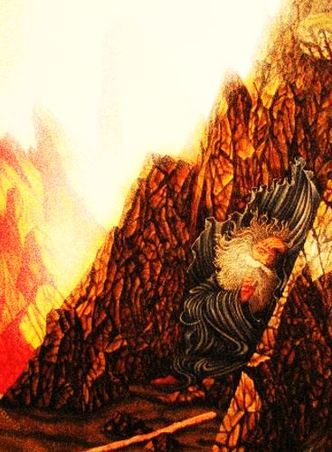
This statement tells us so much! The Creator said He would make known to Moses not His glory, as Moses so erroneously thought he needed, but His goodness. This self-description is the profession of the way the Holy One interacts with us. It is an intimate utterance of the ways He desires to be towards us who are in covenant with Him.
This declaration is known popularly as Shelosh-Esreh Middot “The Thirteen Qualities,” or more anciently, Shelosh-Esreh Derakhim “The Thirteen Ways,” as they are not to be viewed so much as qualities as the paths in which He deals with us as His people. There exists even some disagreement as to how the thirteen are numbered in the count, but that matters not, ultimately. What is important is that this declaration comprises the goodness that He said He would make known to Moses. This is what Moses needed. This is what we need. His people can easily fall out of balance in what we are seeking from Him, but we thankfully can slide right back into alignment with Him if we will keep this revelation in mind as a prime factor in our faith.
In fact, this revelation of His ways was viewed as so significant in ancient Israel that it came to be referred to repeatedly throughout the Scriptures. It is mentioned in whole or in part in nine (9) different places in the Word apart from this initial declaration. One can read those references in the following passages:
The Creator desires to interact us with in ways that express His covenant trustworthiness. Before we are separated from Him by a sin, He is our Holy One. After we are separated from Him by a sin, He is our Holy One. He is our Deity with compassion, giving us room to grow. He is our Deity in mercy, bestowing grace when we have failed Him in some way. He is long-suffering towards us when we have been led astray by fleshly pursuits, not abandoning us in haste. He is great in treating us with love and with truth, to the point of guarding that path of love towards us so He is not easily moved. Even so, He cares for us enough in covenant to not overlook our iniquity, error, and sin, so that we do not get a free pass to do as we like. Rather, He makes sure the sins are dealt with, to the point of visiting them upon our progeny, that they might make right the wrong we allowed.
These are the paths of His goodness towards us.
These are what He wants to give to us – not the glories we might imagine we need from Him.
In all of this, however, there is something that need not be overlooked.
How did Moses receive this expression of goodness from the Holy One?
Where was he when this goodness was revealed?
Moses was in the “cleft” of the rock.
This declaration is known popularly as Shelosh-Esreh Middot “The Thirteen Qualities,” or more anciently, Shelosh-Esreh Derakhim “The Thirteen Ways,” as they are not to be viewed so much as qualities as the paths in which He deals with us as His people. There exists even some disagreement as to how the thirteen are numbered in the count, but that matters not, ultimately. What is important is that this declaration comprises the goodness that He said He would make known to Moses. This is what Moses needed. This is what we need. His people can easily fall out of balance in what we are seeking from Him, but we thankfully can slide right back into alignment with Him if we will keep this revelation in mind as a prime factor in our faith.
In fact, this revelation of His ways was viewed as so significant in ancient Israel that it came to be referred to repeatedly throughout the Scriptures. It is mentioned in whole or in part in nine (9) different places in the Word apart from this initial declaration. One can read those references in the following passages:
- Numbers 14:18
- Joel 2:13
- Jonah 4:2
- Nahum 1:3
- Psalm 86:15
- Psalm 103:8-10
- Psalm 145:8
- Nehemiah 9:17
- Romans 2:4
The Creator desires to interact us with in ways that express His covenant trustworthiness. Before we are separated from Him by a sin, He is our Holy One. After we are separated from Him by a sin, He is our Holy One. He is our Deity with compassion, giving us room to grow. He is our Deity in mercy, bestowing grace when we have failed Him in some way. He is long-suffering towards us when we have been led astray by fleshly pursuits, not abandoning us in haste. He is great in treating us with love and with truth, to the point of guarding that path of love towards us so He is not easily moved. Even so, He cares for us enough in covenant to not overlook our iniquity, error, and sin, so that we do not get a free pass to do as we like. Rather, He makes sure the sins are dealt with, to the point of visiting them upon our progeny, that they might make right the wrong we allowed.
These are the paths of His goodness towards us.
These are what He wants to give to us – not the glories we might imagine we need from Him.
In all of this, however, there is something that need not be overlooked.
How did Moses receive this expression of goodness from the Holy One?
Where was he when this goodness was revealed?
Moses was in the “cleft” of the rock.
In the translation I made above from the original Hebrew text of Exodus 33:22, I opted to use the word “hole” for the Hebrew term NIQ’RAT. NIQ’RAT is of interest to us in that it literally means “piercing.” By extension, the concept of “hole” makes sense, but the core idea is that of something created by being pierced-through.

Generally, translations will go with the rendering of "cleft" because of the familiarity of the term with readers, and the concept of cleft does convey enough of the sense for the reader to understand Moses took refuge in the rock to experience this event. In the word's Middle English form of "clift," which ultimately became "cleft," the term did mean "a space made by cutting," and in that sense would be generic enough to give the idea. However, since we have the ability to bring clarity to the original Hebrew term with a closer rendering, it is important that it be done and its significance explained. With this clearer idea from the inspired Text now presented, let us return to the fact of where Moses was during the time the Almighty revealed His goodness to him as He passed by:
He was inside a rock that was pierced.
The only place on the mountaintop deemed by the Holy One as safe and acceptable for a sin-scarred human being in relationship with Him to experience the intimate expression of the Creator towards mankind was in a particular area of that Arabian summit stone which was curiously pierced-through at some point in time by geological or meteorological phenomena. In that spot alone would Moses be safeguarded to experience the expression of the Almighty that would further the intimate relationship between Israel and the Creator. In the pierced rock Moses would be able to learn of His goodness.
He was inside a rock that was pierced.
The only place on the mountaintop deemed by the Holy One as safe and acceptable for a sin-scarred human being in relationship with Him to experience the intimate expression of the Creator towards mankind was in a particular area of that Arabian summit stone which was curiously pierced-through at some point in time by geological or meteorological phenomena. In that spot alone would Moses be safeguarded to experience the expression of the Almighty that would further the intimate relationship between Israel and the Creator. In the pierced rock Moses would be able to learn of His goodness.

Notice that the Hebrew Text as rendered above in Exodus 33:22-23 also tells us that the Holy One covered His servant in the rock in a particular manner. The Text tells us that He used His "palm" to do so. While most translations are satisfied to render "hand" in their English versions, the Hebrew has the term KAF, which is more pointedly referencing the open palm of the hand than just the general idea of the appendage. This distinction merits a closer translation than "hand," in my opinion. Moses was hidden in the rock by the palm of the Most High who covered that piercing while He passed by and proclaimed His goodness.
Consider the spiritual symbolism in that.
Moses needed the goodness of the Holy One, but he could only experience it from the safety of the rock that was pierced while the open palm of the Holy One covered that pierced place. With insight we can see the powerful symbolism of the depth of wisdom in the redemptive plan of the Holy One. His goodness will come to us in covenant when we are in the right place – when we are in the Rock that was pierced – Messiah, the Rock of Israel, pierced for our transgressions. Messiah is referred to as the “Rock” in seventeen (17) passages of Scripture (see: Isaiah 8:14, Isaiah 28:16, Psalm 118:22, Daniel 2:34, Matthew 21:42, Matthew 21:44, Mark 12:10, Luke 20:17, Luke 20:18, Acts 4:11, Romans 9:33, 1st Corinthians 10:4, Ephesians 2:20, 1st Peter 2:4, 1st Peter 2:6, 1st Peter 2:7, and 1st Peter 2:8).
If we are not in our proper place in Messiah, even the goodness of the Most High will do us no good. We must first be found in the place of His choosing if we are to benefit from the goodness He desires to express to us. It is only in the believer’s relation to the pierced Rock that we can experience in full the intimate declaration of the goodness of the Holy One. In that unique place near Him – in the Rock that was pierced – will man experience and appreciate His goodness.
This one brief example from the life and witness of Moses sheds an important light on the tendency for even the believer focused on the Spirit to sometimes focus on the wrong aspects of his walk at any given moment. Not a one of us is immune to the possibility of missing the path He wishes us to experience Him on. The redeemed mind will naturally seek out the things of the Spirit, but we do not always seek out exactly what it is that He wants to give us at that moment – those ways in which He desires to interact with His people. However, He has preserved in His Torah the simplistic truth of how it is that He really wants to relate to us: by showing us not His glory, but His goodness.
Consider the spiritual symbolism in that.
Moses needed the goodness of the Holy One, but he could only experience it from the safety of the rock that was pierced while the open palm of the Holy One covered that pierced place. With insight we can see the powerful symbolism of the depth of wisdom in the redemptive plan of the Holy One. His goodness will come to us in covenant when we are in the right place – when we are in the Rock that was pierced – Messiah, the Rock of Israel, pierced for our transgressions. Messiah is referred to as the “Rock” in seventeen (17) passages of Scripture (see: Isaiah 8:14, Isaiah 28:16, Psalm 118:22, Daniel 2:34, Matthew 21:42, Matthew 21:44, Mark 12:10, Luke 20:17, Luke 20:18, Acts 4:11, Romans 9:33, 1st Corinthians 10:4, Ephesians 2:20, 1st Peter 2:4, 1st Peter 2:6, 1st Peter 2:7, and 1st Peter 2:8).
If we are not in our proper place in Messiah, even the goodness of the Most High will do us no good. We must first be found in the place of His choosing if we are to benefit from the goodness He desires to express to us. It is only in the believer’s relation to the pierced Rock that we can experience in full the intimate declaration of the goodness of the Holy One. In that unique place near Him – in the Rock that was pierced – will man experience and appreciate His goodness.
This one brief example from the life and witness of Moses sheds an important light on the tendency for even the believer focused on the Spirit to sometimes focus on the wrong aspects of his walk at any given moment. Not a one of us is immune to the possibility of missing the path He wishes us to experience Him on. The redeemed mind will naturally seek out the things of the Spirit, but we do not always seek out exactly what it is that He wants to give us at that moment – those ways in which He desires to interact with His people. However, He has preserved in His Torah the simplistic truth of how it is that He really wants to relate to us: by showing us not His glory, but His goodness.
All study contents Copyright Jeremy Chance Springfield, except for graphics and images, which are Copyright their respective creators.
